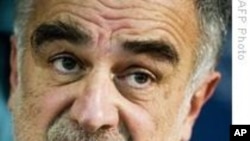A group representing victims of Kenya's post-election violence is urging The Hague to intervene and prosecute those most responsible for the organized slaughters. The victims play just one part in the complex web of political realities facing the International Criminal Court's chief prosecutor as he arrives Thursday for a face-to-face meeting with Kenya's government leaders.
ICC chief prosecutor Luis Moreno Ocampo's visit follows the Kenyan government's failure to meet a September 30 deadline agreed to by a Kenyan delegation to set up a process to prosecute the top suspects in post-election violence locally.
Under the deal, Kenya agreed to refer the matter to The Hague if it failed to create a special tribunal within the designated timeframe.
Kenya fell into a weeks-long crisis following a flawed December 2007 presidential election that supporters of the main rival to incumbent President Mwai Kibaki claim was "stolen."
The disputed poll results sparked an outburst of ethnically-targeted violence that killed at least 1,300 and displaced hundreds of thousands more, many of whom remain stranded in makeshift camps.
The brutal mayhem caught many Kenyans and outside observers by surprise. The most economically powerful nation in East Africa has historically been considered a stabilizing force in an often volatile region, but the 2008 political crisis blew open festering land and discrimination issues that had built up over decades of tribal-based power politics.
A group of lawyers told post-election victims Tuesday that they must collectively push Ocampo for justice, saying the government agenda is being run by those suspected of perpetrating the violence.
The head of an organization representing several victims, attorney Mbuthi Gathenji, similarly called for urgency in carrying out the investigations. He joined other lawyers in urging the ICC prosecutor to meet directly with those who were hurt by the violence.
"If it is possible, the victims feel an engagement with Ocampo would be a very good step to build confidence in the ICC. Not only that, they would like him to his time off and visit the scenes of crimes," said Gathenji.
The looming intervention from The Hague puts Kenya's two power-sharing heads in a tough position politically. President Kibaki and his former election foe, Prime Minister Raila Odinga, are both allied politically to powerful politicians believed to sit at the top of Ocampo's target list.
But Kenyan politicians are not the only ones caught walking a political tightrope due to the special attention Kenya is receiving internationally. Analysts say Ocampo is proceeding cautiously towards Kenya because of pressure the prosecutor is feeling from critics who accuse the Court of being overly aggressive towards Africa.
"My own conclusion is that the Kenyan president and prime minister will not refer the situation to the ICC, so it will be up to Ocampo to invoke his powers for there to be any formal investigations. But he will be informed, not only by local developments in Kenya, but also by those concerns that have been expressed by many on the continent, that as some allege, that somehow the ICC process is skewed against the African continent," he said.
Gideon Maina, a Kenyan international law lecturer, says Ocampo is also under strong pressure from the West to do something about the Kenyan situation.
Kenya's next elections are scheduled for 2012, and many fear that if key reforms are not implemented and the culture of political impunity is not fundamentally shaken, the upcoming political cycle could prove much more damaging than the last.
"Much as the ICC ought to operate independently, there is a lot of international pressure and international consensus that Kenya needs to be fixed before 2012. And as much as Ocampo is a lawyer, he is not naive to the fact that the perceived success of the ICC will depend maybe on how he tackles Kenya," he said.
Kenyan civil society actors have also played a major role in calling for The Hague's intervention. Musila, who frequently meets with those Kenyan groups pushing for ICC investigations, sees these local players as the most powerful factor in pushing Ocampo to take action in Kenya.
"The drive until now in fact has been driven by local civil society, although the international community, in particular the diplomatic corps in Nairobi, tends to support the position of the civil society," he said.
Both Musila and Maina agreed that the earliest one could expect any indictments from the court would be late 2010, and only if the ICC's lengthy pre-trial process is began in earnest very soon.






